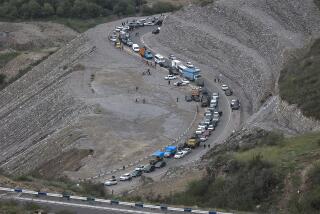Russia agrees to pull out from Georgia
- Share via
MOSCOW — Russia will pull its troops out of Georgia proper in one month, Russian President Dmitry Medvedev pledged Monday, but only after international monitors deploy near the breakaway republics of Abkhazia and South Ossetia.
Russia agreed to the withdrawal after receiving a security guarantee that Georgia will not attack the Russian-backed republics, said Medvedev, who appeared alongside French President Nicolas Sarkozy after talks in Moscow. Abkhazia and South Ossetia are seeking independence from Georgia.
Under the agreement, 200 international monitors will take up their posts in Georgia just outside the republics by Oct. 1. Within 10 days of that deployment, the Russian troops will withdraw.
The deal allows both leaders to point to a victory: Medvedev collected a Georgian guarantee against using force; Sarkozy negotiated a Russian withdrawal on behalf of the European Union, which he currently leads.
In their televised news conference, Medvedev and Sarkozy appeared eager to show that the spike in diplomatic hostilities between Russia and Europe has been eased. Each took pains to confer some legitimacy upon the other’s arguments.
The EU’s behavior has been “on the whole fairly balanced,” Medvedev said.
“Everything is absolutely clear,” Sarkozy said. “We want partnership and peace, and hardly anybody wants a confrontation between Europe and Russia.”
Skirmishes flared into full-blown war one month ago, when Georgia launched a military operation in the rebel province of South Ossetia, home to Russian peacekeeping troops and residents who carry Russian passports. The aggression drew the crushing wrath of Moscow, which sent thousands of troops, tanks and fighter jets to shatter Georgia’s U.S.-trained military.
The war ripped open old Cold War animosities as the United States and Europe vehemently condemned Moscow. Russian officials, meanwhile, accused the West of turning a blind eye to the deaths of South Ossetians.
But the fighting was also a stark reminder that Europe’s thirst for Russian oil and gas and Russia’s reliance on the European market lock the two into a codependence that overshadows even sharp ideological disputes.
Medvedev alluded vaguely to those differences on Monday, telling reporters that he still wasn’t satisfied with the EU’s response to Georgia’s aggression in South Ossetia. Still, he said, the EU position was reasonable compared with “exotic and even extremist viewpoints calling for strange sanctions or other actions against Russia.”
The United States has taken the hardest line against Moscow, pledging $1 billion to help Georgia rebuild and calling for reprisal against Russia.
On Monday, Washington abruptly pulled out of a hard-negotiated civilian nuclear cooperation pact with Russia. Under the agreement, the countries would have shared knowledge about civilian nuclear technology, and Russia would have become a repository for storing spent nuclear fuel.
When the deal was signed in May, it was cheered as a symbolically laden illustration of post-Cold War tolerance between Washington and Moscow.
“We make this decision with regret,” Secretary of State Condoleezza Rice said in a statement. “Unfortunately, given the current environment, the time is not right for this agreement.”
Meanwhile, lingering uncertainties continue to cloud the fragile cease-fire in Georgia.
This is not the first time Sarkozy has come to Moscow, talked with Medvedev and left with the expectation that Russia would withdraw from Georgia proper. After negotiating the current cease-fire with the French president last month, Russia left its troops in Georgia, ignoring international objections.
Trouble also looms over Russia’s unilateral recognition of the rebel enclaves as independent nations. Only Nicaragua has joined Moscow in recognizing the territories’ independence.
“We have made the choice for ourselves. This choice is final and definitive; our decision is irrevocable,” Medvedev said Monday, keeping up the defiant tone that has marked Moscow’s widely condemned decision to recognize the republics. “There are now two new states.”
Moscow is expected to expand its military presence in the separatist republics, arguing that the “peacekeepers” are present at the request of the local governments.
But Georgian officials want Russian soldiers removed wholesale from the republics. If Russia is a party to the war, they argue, its troops cannot be considered peacekeepers.
Moscow appears determined to press ahead. The Russian Foreign Ministry announced that it would open diplomatic relations with Abkhazia and South Ossetia today.
--
More to Read
Sign up for Essential California
The most important California stories and recommendations in your inbox every morning.
You may occasionally receive promotional content from the Los Angeles Times.










